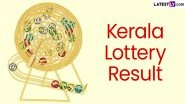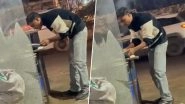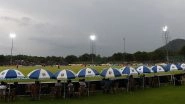Minsk, Aug 12 (AP) Hundreds of women rallied across Belarus' capital Wednesday to protest a brutal police crackdown that left hundreds injured and thousands detained while challenging election results extending the rule of the country's authoritarian leader.
In several parts of Minsk, groups of women formed human chains, chanting “Shame!” and urging authorities to stop their violent suppression of demonstrations. Police moved to disperse them — but stopped short of violent tactics they have used previously.
Protesters are contesting the official count showing President Alexander Lukashenko winning a sixth term with 80% of Sunday's vote and the main opposition challenger with 10%. Crowds have taken to the streets every night since to demand a recount.
Authorities have responded with a crackdown that was unusually brutal even for Lukashenko's 26-year authoritarian rule. Police have dispersed protesters with tear gas, stun grenades, water cannons and rubber bullets and beat them with truncheons. Black-uniformed officers chased protesters into residential buildings and deliberately targeted journalists, beating many and breaking their cameras.
“We stand for a peaceful protest,” said Ksenia Ilyashevich, a 23-year-old IT specialist who joined other women in Minsk protest. “We worked up the courage and came out to rally. ... Hundreds and thousands of Belarusians express solidarity with us, but are afraid (to come out).
We stand here for all.” In three nights of protests, at least 6,000 people have been detained and hundreds injured, according to the official count that appeared to downplay the crackdown's scope. Anguished relatives were besieging prisons across Belarus trying to find their missing relatives.
“Even those who were loyal saw the real face of this government during the past three days,” said 63-year-old Galina Vitushko, who stood outside a jail in Minsk, trying to find her son, a 43-year old doctor. She said that she desperately needs to give him insulin since he has diabetes.
“It's a real harassment, how can you treat your own people like that?” she asked, breaking into tears. “The real winners don't behave like that.”
The 65-year-old Lukashenko has led the 9.5-million country with an iron fist since 1994, relentlessly stifling dissent and winning the nickname of “Europe's last dictator” in the West.
This year the economic damage caused by the coronavirus and the president's swaggering response to the pandemic, which he airily dismissed as “psychosis,” has fueled broad anger, helping swell the opposition ranks — but that has only elicited a more forceful crackdown from the Belarusian leader.
Lukashenko has derided the political opposition as “sheep,” manipulated by foreign masters and vowed to continue clamping down on demonstrations.
“The core of these so-called protesters are people with a criminal past and (those who are) currently unemployed,” Lukashenko said during a Wednesday meeting with security officials.
His top challenger, a 37-year-old former teacher and political novice Sviatlana Tsikhanouskaya, managed to unite fractured opposition groups and draw tens of thousands to her campaign rallies after two top potential challengers were barred from the race.
But she left for neighboring Lithuania on Tuesday in an abrupt about-face, hours after publicly disputing the vote results and submitting a formal request for a recount. She urged her supporters to end rallies in a video statement her associates said was recorded under pressure from law enforcement officials.
Her departure didn't discourage protesters. One demonstrator died Monday in Minsk, when an explosive device he attempted to throw at police exploded in his hands, according to the Interior Ministry.
On Tuesday, a protester in the city of Brest on the border with Poland was shot and wounded when officers fired on protesters who attacked them with metal rods.
In Minsk, reporters from several Belarusian and international outlets were beaten up. Officers seized memory cards from a group of photographers, including one for the AP, as they took shots of the police crackdown.
“A deliberate hunt for journalists with independent Belarusian and foreign media has begun,” said Boris Goretsky, vice president of the Belarusian Association of Journalists. He said 25 reporters are currently in custody, awaiting their turn to face a court, and three more were sentenced to 10 to 15 days of administrative arrest.
A prominent editor at a popular Belarusian newspaper disappeared on Monday night. Yegor Martinovich, editor-in-chief of Nasha Niva, managed to send his colleagues an “SOS” message on Monday evening, and no one has heard from him ever since.
Belarusian human rights group Viasna said many injured protesters were afraid to seek medical help, fearing prosecution for participating in the rallies.
Eduard Kukhterin, a 56-year-old publisher, was injured with two rubber bullets overnight as he was entering his apartment building, but decided not to go to a hospital. “Paramedics warned me that if I go to the hospital, I will end up behind bars as a protester. Medical workers report such injuries to the law enforcement,” Kukhterin told the AP.
The crackdown has drawn harsh criticism from the European Union and the United States. (AP)
(The above story is verified and authored by Press Trust of India (PTI) staff. PTI, India’s premier news agency, employs more than 400 journalists and 500 stringers to cover almost every district and small town in India.. The views appearing in the above post do not reflect the opinions of LatestLY)













 Quickly
Quickly


